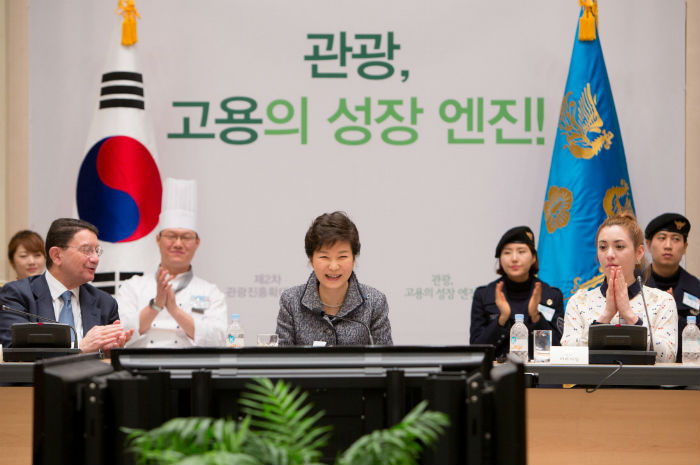The South Korean government said Sunday it will create a business environment to induce more than 25 trillion won ($23.2 billion) in investment by local companies to build up the country’s tourism industry and corporate competitiveness.
The plan, formulated jointly by the Ministry of Strategy and Finance, the Ministry of Land, Infrastructure and Transport, the Ministry of Culture, Sports and Tourism and other government agencies, calls for the prompt spending of 16.8 trillion won already earmarked for four mega projects, while attracting 8.5 trillion won in fresh investment to build two new integrated resorts with casinos and tourist hotels and develop scenic coastal regions.
 The government established the plan as corporate investment, which contracted for five straight quarters from January-March of 2012, started to show signs of recovery in the second half of 2014. In the first three quarters of 2014, facility investment grew 6.3 percent on-year.
The government established the plan as corporate investment, which contracted for five straight quarters from January-March of 2012, started to show signs of recovery in the second half of 2014. In the first three quarters of 2014, facility investment grew 6.3 percent on-year.
Despite such gains, policymakers stress that recovery remains fragile due to various downside risks and weakening corporate profit margins.
Speaking to reporters, deputy finance minister Jeong Eun-bo said the latest government plan strives to fuel growth in tourism and promising service industries as well as help cutting edge technology businesses.
Among the four mega projects, there has been progress in negotiations between the Seoul city government, the defense ministry and Korea Land and Housing Corp. on developing the sprawling U.S. 8th Army’s Yongsan garrison in the capital, Jeong said. There will be government support for development of land in southern Seoul formerly used as the headquarters of Korea Electric Power Corp., constructing auxiliary facilities for a large cogeneration plant, and the expansion of a organic light-emitting diode (OLED) assembly line, he said.
The Yongsan land project involves 5 trillion won worth of investment to utilize real estate that will be vacated by U.S. forces in Korea.
“The goal is to get development authorization by April so investment can be made in the second half of this year for the land currently occupied by the United Nations Command,” the official said. Most military facilities in Yongsan are to be consolidated in Pyeongtaek, 70 kilometers south of Seoul, by 2016.
Jeong said Seoul municipal authorities agreed to a “fast track” approach for developing the former KEPCO site, purchased by Hyundai Motor Group for 10.55 trillion won last year, to shorten the administrative process that would normally take eight years.
“The goal is to allow development to begin as early as 2016,” the senior official said.
Industry watchers expect Hyundai to submit its building plan, estimated to require 5 trillion won in funds, around March for approval.
The cogeneration plant and OLED assembly line could result in investments of 2.8 trillion won and 4 trillion won, each.
Regarding fresh investments, the finance and culture ministries said 1 trillion won worth of funds would be available at low interest to construct 5,000 hotel rooms by 2017. This move is expected to allow the country to meet a sharp rise in foreign tourists whose number ballooned to 14.2 million in 2014. In the last five years, inbound tourist numbers have risen an average of 12 percent annually.
The government said it will allow more funds to be given to individual hotel projects, as well as make it possible for real estate investment trusts to enter the hotel business.
Besides hotels, policymaker said four new duty-free shops will be opened in Seoul and Jeju Island, while two new integrated resorts with casinos, theme parks and lodgings will be authorized.
“Limits imposed on the building of new resorts with casinos will be lifted so they can be built even inside free economic zones by both local and foreign investors,” Park Min-gwon, deputy minister for the tourism ministry, said.
Each resort will draw in at least 1 trillion won in new investments, he said. The casinos, however, will only be open to foreign tourists.
The land ministry said that related laws will be changed to allow various facilities to be built on scenic shorelines to attract tourists. Some 5 trillion won could be invested to enlarge Pangyo Techno Valley south of Seoul by at least two thirds beyond its current size.
In addition, the ministry said it hopes to designate six new hightech urban industrial centers and foster the growth of the aircraft maintenance, repair and overhaul (MRO) sector by allowing foreign companies to hold more than a 50 percent stake in such companies. The MRO sector could attract some 500 billion won worth of investment.
The master plan includes 20 trillion won in funds this year for loans to tech-oriented companies, up from 8.9 trillion won last year. There will also be a 500 billion won “China fund” to help local companies enter the Chinese market once the free trade agreement with the neighboring country is ratified, the government said. (Yonhap)

